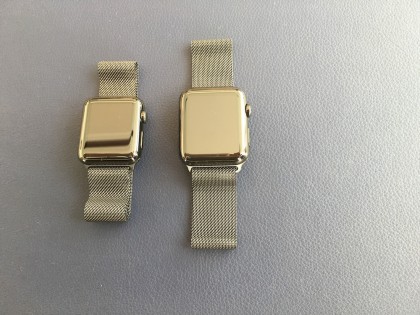This is a fantastic story about a young skinny kid who was constantly overlooked, by high school coaches, by Virginia Tech and, ultimately, by Nike.
Nike owned the first opportunity to keep Curry. It was its privilege as the incumbent with an advantage that extended beyond vast resources. “I was with them for years,” Curry says. “It’s kind of a weird process being pitched by the company you’re already with. There was some familiar faces in there.”
Curry was a Nike athlete long before 2013, though. His godfather, Greg Brink, works for Nike. He wore the shoes growing up, sported the swoosh at Davidson. In his breakout 54-point game at Madison Square Garden on Feb. 28, 2013, he was wearing Nike Zoom Hyperfuse, a pair of sneakers he still owns, tucked away in his East Bay Area home, shielded from the light of day.
Then came the pitch meeting, where Nike tells Curry how much he means to them. Remember, this is before his truly breakout season, before everyone knew how elite a player Curry truly is.
The pitch meeting, according to Steph’s father Dell, who was present, kicked off with one Nike official accidentally addressing Stephen as “Steph-on,” the moniker, of course, of Steve Urkel’s alter ego in Family Matters. “I heard some people pronounce his name wrong before,” says Dell Curry. “I wasn’t surprised. I was surprised that I didn’t get a correction.”
It got worse from there. A PowerPoint slide featured Kevin Durant’s name, presumably left on by accident, presumably residue from repurposed materials. “I stopped paying attention after that,” Dell says. Though Dell resolved to “keep a poker face,” throughout the entirety of the pitch, the decision to leave Nike was in the works.
There’s an Apple angle here, too:
As athletic companies move into wearable technology, Nike boasts Apple CEO Tim Cook as a member of its board. Sonny Vaccaro is less sanguine on what losing Curry means for one of the world’s biggest companies. “This is Nike’s biggest fear,” he says. “They can’t overcome this in the shoe business. This is going to be detrimental to them. Psychologically.”
Finally, there’s this gem:
In 2013, Nike retained Curry’s matching rights, analogous to how NBA restricted free agency works. They still could have signed Curry, regardless of his preferences. According to a Sept. 16, 2015, report from ESPN’s Darren Rovell, “Nike failed to match a deal worth less than $4 million a year.”
Curry’s current value to Under Armour is pegged by Morgan Stanley as $14 billion. That’s a helluva miss.
[H/T Daniel Mark]

